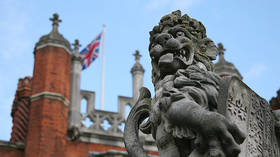‘Our NHS, hallowed be thy name’ – Brits need to see health service for bloated bureaucracy it is and reform it now
The evidence shows that other countries’ healthcare systems have been vastly more effective in the fight against Covid-19, but our fawning, misplaced adulation for the NHS blinds the press and politicians to all its many faults.
Britain has a state religion, a government-run faith that is infallible, adored, praised and to be worshiped by all. Blasphemers against this national creed are decried in public, shunned, cast out and chastised by the press and politicians; they are monstered on social media by self-appointed inquisitors. Its clergy are venerated as heroes on a holy crusade to protect the nation, funded by a tithe whisked out of every paycheck issued in the UK. But this god is not Allah, Yahweh, or Jesus, it is “our NHS,” hallowed be thy name.
Genesis
In the beginning, 1948 to be exact, the National Health Service was established by Nye Bevan, the health minister, under Clement Atlee’s Labour government that took office after the Second World War. Bevan, a Welsh socialist Moses, issued these three commandments at its birth: that it meet the needs of everyone, that it be free at the point of delivery, and that it be based on clinical need, not ability to pay.
An oft-forgotten side note to the story of the NHS’ origin is that it was opposed by the very people who would become its high priests. The British Medical Association was vehemently against doctors becoming direct employees of the state and threatened to boycott the fledgling healthcare system. However, they were eventually won over and so the NHS came into being.
Also on rt.com UK spy agency handed extra powers to access info from NHS IT systems during Covid-19 pandemicIt has ever since been held up as the Labour Party’s greatest achievement to date and is so adored that it was featured in the London Olympics opening ceremony in 2012, to the bafflement of the rest of the world.
Chronicles
The NHS costs a fortune. It may be “free” at the point of use for those who end up in hospital, but it has been the recipient of monumental sums of money ever since its inception. Its finances have never been cut, and at every election, the UK’s political parties battle between them to promise to blow the most amount of money on the bloated, bureaucratic behemoth.
It even became a political football during the EU referendum with the £350 million-a-week ($440 million) extra funding for the NHS claim famously emblazoned across a bus being one of the most hotly debated claims of the campaign, despite it in no way being a core issue of the vote.
In 1950, it cost Britain, which was still reeling from the trials of the Second World War, £460 million ($578 million). This year, even before the coronavirus struck, it was projected to cost around £158.4 billion ($199 billion), an increase so vast that the original amount is a barely registerable decimal point, and yet it is never, EVER, enough.
Despite the herculean amounts of cash that have been flung at it, for more than two decades, the NHS’ most strident supporters have claimed that it has been in financial crisis. Since 2000, we have at various points allegedly had anywhere between six months and 24 hours to “save the NHS,” and yet here it remains.
Lamentation
Another interesting fact about “our“ NHS is that nothing is ever its fault. There have been a fair few hiccups in the organization’s 72-year history, yet, somehow, none of the blame has fallen on it. For example, the disgrace that was the Stafford Hospital scandal, which saw anywhere between 400 and 1,200 patients dying in a 50-month period between January 2005 and March 2009. Horrifying stories emerged of patients being left so thirsty they were forced to drink out of flower vases and left screaming in pain for hours on understaffed wards.
“Mid-Staffs” became a byword for appalling care, but despite damning findings in an inquiry, there were no calls for reforming the NHS.
I could list example after example, would space permit me. NHS Wales has constantly had problems with a shortage of doctors and yet that is somehow not the fault of the NHS but some other external force over which the sainted health service has no control.
Every winter, we are bombarded with stories about bed shortages and how the service has been stretched to capacity but this is never, ever in any way the fault of the NHS as an organization and its mismanagement. It’s simply ‘We need more money. Now.’ How can this conceivably be the case?
Revelation
Despite all the dutiful clapping, rainbow paintings, and constant exhortations to “protect our NHS” (for some reason ranking above “save lives” in the government’s insipid new mantra), Covid-19 has exposed the flaws in our health system. A rational nation would accept this as a reality, but bafflingly, the press and opposition politicians are simultaneously saying that it is a national disgrace that the UK is on course for the highest death toll in Europe, while claiming that we have the finest healthcare system ever devised. There is simply no way both these things can be true.
Also on rt.com A UK healthcare worker’s life is worth TWO jobs at Victoria Beckham's fashion houseThe Deep Knowledge Group has conducted a study into how countries' healthcare systems around the world have coped with the pandemic and Britain does not fare well. In Europe, the research puts the UK as the 30th safest country in terms of Covid-19 with just San Marino, Italy and Spain ranking below it.
In any other nation, this might lead to a sensible discussion over whether or not some sort of reform of the healthcare system might be necessary. The NHS has been short of personal protective equipment in this crisis – does anyone lay some, any, of the blame at the feet of the healthcare system and their slow, form-filling-in-triplicate bureaucrats? No. It’s the politicians. Or – as always – we need more money.
A country capable of having a normal discussion about its hospitals may conclude, if there were a paucity of ventilators for example, that at least some of the fault lay in the way the organization was run. Britons looking purely at the facts rather than the mythology around the NHS might ask themselves why, if it is so bloody brilliant, no other nation on the planet has replicated it?
Wisdom
A dispassionate look at the figures makes it abundantly clear that Germany’s healthcare system is far superior to the NHS. The UK and Germany are perfectly comparable countries, both Western European democracies with large populations and a number of densely populated cities. Yet the death rate in the UK per million people is four times higher than in Germany.
Why is this the case? Well, yes, Germany does spend more on their healthcare system than Britain, but, crucially, the German system is regionalized and most of the hospitals that participate in the universal healthcare provision scheme are not run by the government.
In fact, 37 percent of them are run by for-profit companies, 34 percent of them are operated by churches and charities, and just 28 percent are under state ownership. By contrast, every single NHS hospital in Britain is state run and the merest suggestion of allowing any private enterprise into the health service is regarded as heresy. This is despite it being abundantly clear that privately operated systems are virtually always more efficiently and effectively run.
Part of Germany used to have a system similar to the NHS: East Germany, But after the wall fell it was only ever the West German system that was going to be adopted by the newly unified country.
Anecdotally and off the record, doctors and nurses in the UK will reveal the enormous bureaucracy and waste in the NHS, but they won’t speak up publicly for fear of being labeled a heretic.
Exodus
Britain has a blind spot when it comes to the NHS, why when so many other industries have been vastly improved by being opened up to private enterprise should the healthcare system be treated any differently? No one wants to go back to our motor industry being run by British Leyland (those of a certain age will remember the Hillman Imp, our inferior equivalent of East Germany’s Trabant).
Nobody thinks that the government would do a better job of running our food supply than the myriad of supermarket chains we have in Britain. Why would healthcare not also benefit from the competitive edge needed to survive in private industry?
No arm of the government should be the subject of such fawning adulation and immunity from criticism, least of all one that is responsible for keeping us alive. Forgive me, Saint NHS, for I have sinned. But you need reforming. Now.
If you like this story, share it with a friend!
The statements, views and opinions expressed in this column are solely those of the author and do not necessarily represent those of RT.
















